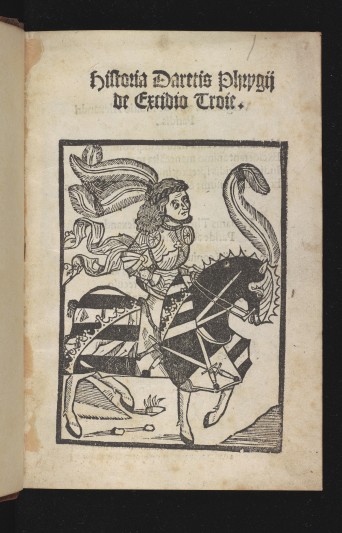Cambridge University Library is very grateful to the Friends of the National Libraries for generously supporting the purchase of an illustrated German post-incunable from the Macclesfield Library. This rare imprint by an otherwise prolific printer is an excellent complement to the University Library’s holdings of post-incunabula and works of Classical scholarship. It is only the third known copy, with an impeccable provenance.
Dares Phrygius is a character from Homer’s Iliad, identified as a Trojan priest, who is named as the purported author of this short account of the fall of Troy. The text suggests that a 1st-century scholar, Cornelius Nepos, discovered a Greek text written by Dares and translated it into Latin. Alongside Dictys Cretensis, with whose work this title is often found, he provides the primary (supposedly eye-witness) account of the Trojan War available to authors in the medieval West; the works were in fact probably composed in the 5th century AD. The paired accounts inspired many medieval vernacular romances by authors such as Geoffrey of Monmouth and Guido de Colonna, as well as Caxton’s Recuyell of the historie of Troye.
Phrygius’ account was first put into print in Cologne prior to 1472 (two copies in the University Library) and a further eight editions were printed before 1500. Several editions were produced in Wittenberg in the early 16th century, firstly by the private press of Nicolaus Marschalk in 1502 (using the same woodcuts as here) and later by Grunenberg, though very few survive; only two other copies are known of the current edition, both in Germany. The Library has copies of four other pre-1550 editions of Phrygius, though none is illustrated.
Grunenberg was a prolific printer, producing more than 400 works between 1508 and 1527. He was the first to print Luther’s works, beginning with the 1516 Theologia deutsch. There are some thirty titles from his press in Cambridge libraries, mostly by Luther and dated after 1520. The earliest held in Cambridge is a 1510 work by Kilian Reuter on music theory. Prior to the acquisition of the Historia Daretis Phrygii de excidio Troie, there was a gap until 1520; this book now represents the key central period of Grunenberg’s activity, previously missing from Cambridge collections.
The copy is from the library of the Earls of Macclesfield at Shirburn Castle with their bookplate and blind stamp, in a 19th-century brown morocco binding with the Macclesfield arms. It joins 11 titles acquired by the Library over the last ten years from the Macclesfield library, all uniformly in excellent condition. It has numerous very attractive woodcut illustrations from the 1502 edition, prompting interesting discussions around printing history or, more widely, the simple recycling of expensive materials.
